BKMT READING GUIDES
We Band of Angels: The Untold Story of American Nurses Trapped on Bataan by the Japanese
by Elizabeth M. Norman
Paperback : 327 pages
2 clubs reading this now
1 member has read this book
Introduction
Hailed by The New York Times Book Review as a "grippingly told" story of "power and relevance," here is the true, untold account of the first American women to prove their mettle under combat conditions. Later, during three years of brutal captivity at the hands of the Japanese, they also demonstrated their ability to survive. Filled with the thoughts and impressions of the women who lived it, "every page of this history is fascinating" (The Washington Post).
We Band of Angels
In the fall of 1941, the Philippines was a gardenia-scented paradise for the American Army and Navy nurses stationed there. War was a distant rumor, life a routine of easy shifts and evenings of dinner and dancing under the stars. On December 8 all that changed, as Japanese bombs rained on American bases in Luzon, and the women's paradise became a fiery hell. Caught in the raging battle, the nurses set up field hospitals in the jungles of Bataan and the tunnels of Corregidor, where they saw the most devastating injuries of war, and suffered the terrors of shells and shrapnel.
But the worst was yet to come. As Bataan and Corregidor fell, a few nurses escaped, but most were herded into internment camps enduring three years of fear and starvation. Once liberated, they returned to an America that at first celebrated them, but later refused to honor their leaders with the medals they clearly deserved. Here, in letters, diaries, and firsthand accounts, is the story of what really happened during those dark days, woven together in a compelling saga of women in war.
Editorial Review
"Found worms in my oatmeal this morning. I shouldn't have objected because they had been sterilized in the cooking and I was getting fresh meat with my breakfast.... I'm still losing weight and so are most of us..."Ruth Marie Straub, an Army nurse, wrote those words in her diary on March 15, 1942, just over three months after the Japanese first bombed the U.S. military base in Manila. She and her colleagues had evacuated the city and established, in the Philippine jungle, hospitals for the skyrocketing numbers of casualties. In the face of the advancing Japanese Army, the nurses and other military personnel continued to retreat, first to the Bataan Peninsula, and then to Corregidor, a rocky island in Manila Bay. Straub was one of the lucky ones; she was evacuated with a handful of other nurses in April 1942. Her remaining colleagues, meanwhile, surrendered with the rest of the U.S. forces in May and were taken to STIC--Santo Tomas Internment Camp, where they were to spend nearly three years in captivity.
We Band of Angels tells the stories of these courageous women, tagged by the American media as "The Angels of Bataan and Corregidor." Utilizing a wide range of sources, including diaries, letters, and personal interviews with surviving "Angels," Elizabeth M. Norman has compiled a harrowing narrative about the experiences of these women--from the country-club atmosphere of prewar Manila; to the jungle hospitals where patients slept on bamboo cots in the open air; to the Malinta Tunnel on Corregidor, where they choked on dust and worked while the bombs rained down above them; to the STIC, where per-person rations were cut to 900 calories a day and the women resorted to frying weeds in cold cream for food. The story Nelson tells is compelling but slightly flawed: like many biographers, Nelson has a deep affection and respect for her subjects, which causes her to soften rough edges. At the same time, however, Nelson argues that these women were not heroes--nor were they angels (in the acknowledgments, Nelson notes that she didn't want the word angels in the title, but the publishers had their way). Perhaps because Nelson is a nurse herself, she is trying to stress that her profession is noble and that these women were, in a sense, just fulfilling their duties.
Nursing is noble, of course, but it is clear that these women were something special. Amazingly, all of the Angels of Bataan, some 99 in number, survived their ordeal--and clearly helped hundreds of the other sufferers survive. We Band of Angels deserves a space on the bookshelves of anyone interested in World War II. --C.B. Delaney
Discussion Questions
No discussion questions at this time.Book Club Recommendations
Recommended to book clubs by 0 of 0 members.
Book Club HQ to over 90,000+ book clubs and ready to welcome yours.
Get free weekly updates on top club picks, book giveaways, author events and more








